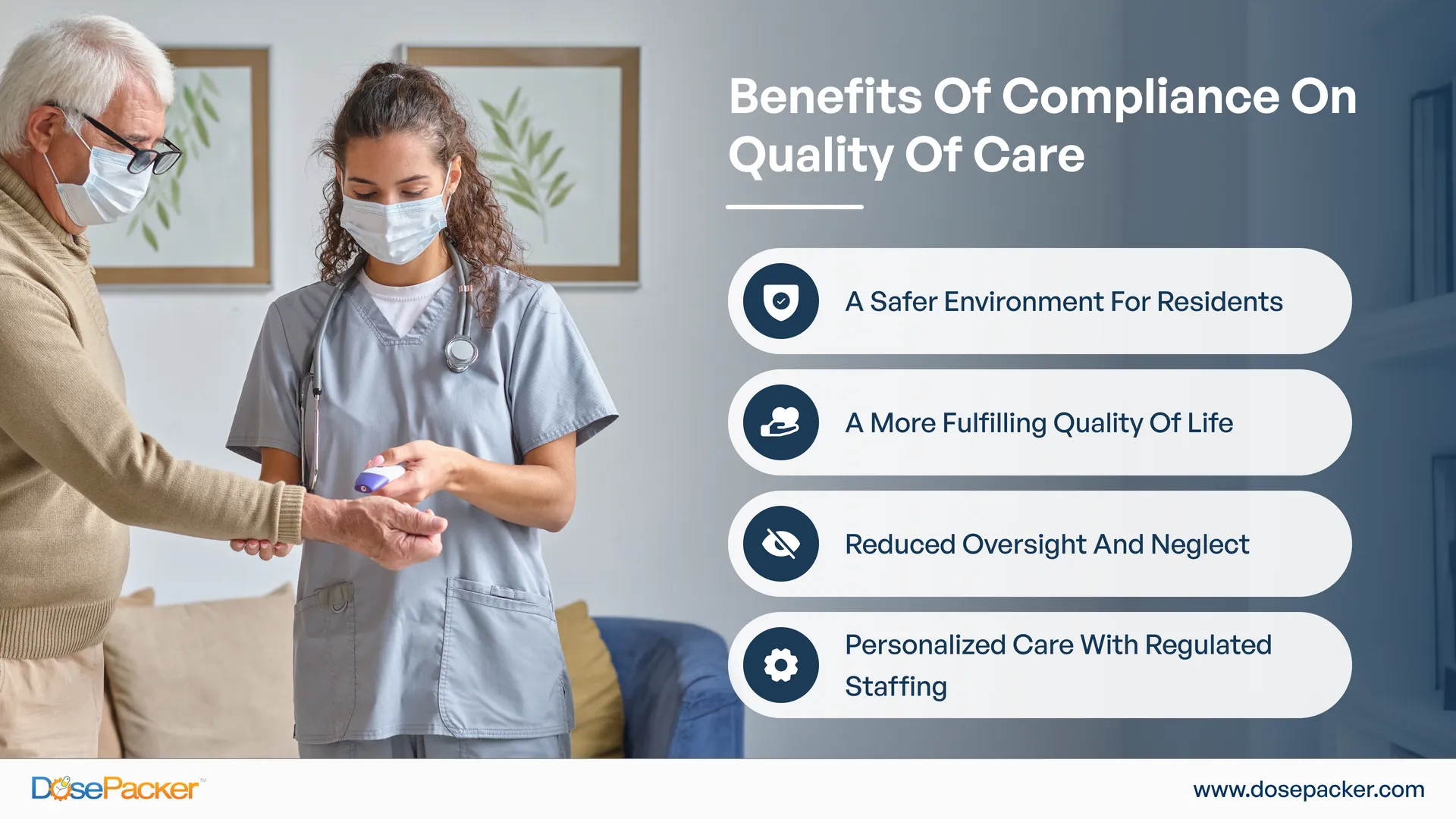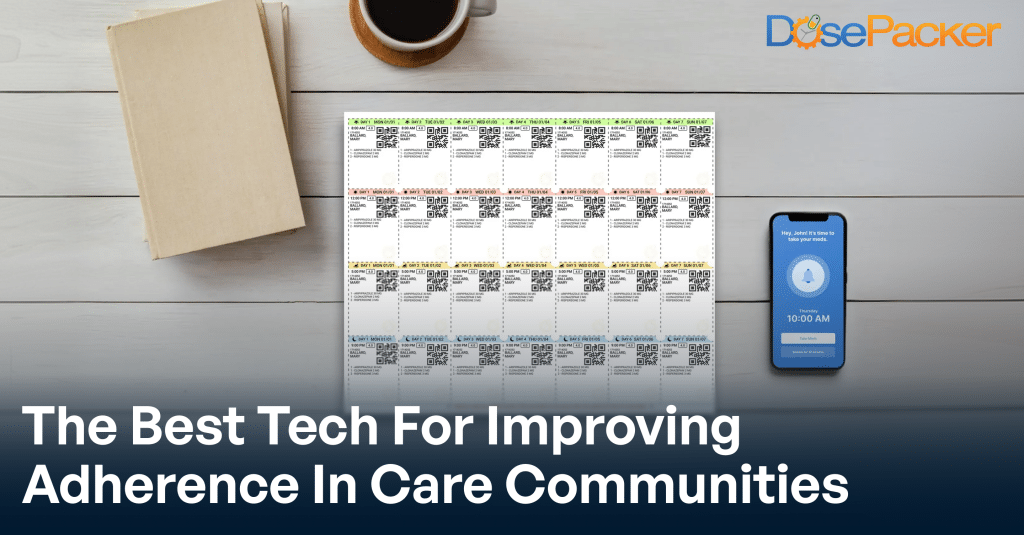- What is Regulatory Compliance in Assisted and Senior Living Communities?
- Key Regulations and Standards Senior Living Communities Must Follow
- The Risks of Non-Compliance in Care Communities
- How Assisted and Senior Living Regulatory Compliance Impacts Quality of Care
- The Role of Technology in Ensuring Regulatory Compliance
- The Power of Compliance in Building Safer Communities
Unlock the latest in medication management technology and grow your care community with us.

In assisted and senior living communities, keeping residents safe, comfortable, and well-cared for is always the goal. But behind the scenes, regulatory compliance ensures those high standards are met every day.
Put simply, compliance means following the rules and guidelines set by health agencies and state authorities. These regulations cover everything from medication management to safety protocols, ensuring every resident is cared for with dignity and respect.
But it’s not just about following the law; it’s about building trust, protecting residents, and keeping operations running smoothly. A report from the National Center for Assisted Living (NCAL) found that recent state regulations focused on infection control and quality, highlighting compliance’s role in resident safety and care.
In this blog, we will dive into why regulatory compliance is essential and how it helps create thriving, supportive senior living communities.
Where Safety Meets Care
What is Regulatory Compliance in Assisted and Senior Living Communities?
Regulatory compliance is the backbone of assisted and senior living, ensuring every resident receives safe, high-quality care. But what does it actually involve? Let’s break it down:
What Does Regulatory Compliance Mean?
It’s all about following laws and guidelines designed to protect residents and maintain high standards in care communities. These rules safeguard health, safety, and overall well-being.
Who Sets the Rules?
Regulatory compliance in assisted and senior living communities is governed by a combination of federal and state regulations, with specific agencies responsible for oversight.
Here are the key players:
- Centers for Medicare & Medicaid Services (CMS):
CMS sets national standards for facilities participating in Medicare and Medicaid programs. Their guidelines cover everything from staffing ratios to infection control practices, ensuring quality care and safety across the board and throughout the U.S. - State and Local Agencies:
State regulatory bodies, typically the state health department or social services department, are primarily responsible for licensing and enforcing regulations in assisted living communities. They enforce their own rules that care facilities must follow.
By following these rules, assisted and senior living communities create spaces where residents can thrive, and families can feel confident their loved ones are in good hands.
Key Regulations and Standards Senior Living Communities Must Follow
With a clear understanding of what regulatory or healthcare compliance means, let’s take a closer look at the specific regulations that senior living communities must follow. These standards are the foundation of safe, ethical, and high-quality care.
Core Areas of Regulation
Assisted and Senior living facilities are governed by various regulations to address critical aspects of resident care and facility operations. Here are some of the most important areas:
- Health and Safety Codes
Care communities must adhere to strict guidelines to ensure a safe living environment. These guidelines include fire safety protocols, emergency preparedness plans, and maintaining clean, sanitary spaces to reduce health risks. - Staffing Ratios
Regulations often require a minimum number of staff members per resident to ensure proper care and attention. These ratios vary by state but are critical for maintaining quality care. - Resident Rights
Residents have the right to privacy, respect, and dignity. Facilities must uphold these rights while ensuring residents can voice concerns without fear of retaliation. - Medication Management Standards
Proper medication administration is non-negotiable. Regulations cover everything from secure storage to accurate dosing and documentation to prevent errors. This is where DosePacker’s solutions help care communities.
Specific Regulations to Know
Here are some key regulations that assisted and senior living facilities must comply with:
- HIPAA (Health Insurance Portability and Accountability Act):
Ensures residents’ medical information is protected and only shared with authorized individuals. - Infection Control Protocols:
Focus on preventing the spread of diseases through hygiene practices, staff training, and monitoring of outbreaks. - Resident Care Standards:
Set guidelines for individualized care plans, including nutritional needs, mobility support, and daily living assistance. - Medication Administration Policies:
Detail requirements for handling, administering, and documenting medications to minimize errors and ensure resident safety.
Compliance isn’t just a legal obligation—it’s a commitment to providing residents with the care and dignity they deserve
The Risks of Non-Compliance in Care Communities
Neglecting regulations can lead to serious consequences for senior communities. Let’s take a closer look at those risks:
- Fines and Fees:
Failure to comply can result in expensive penalties that quickly add up and impact the facility’s finances. - Losing Your License:
In some cases, non-compliance can result in losing your operating license, which could mean services are suspended or the facility is shut down. - Lawsuits:
When residents suffer from neglect or inadequate care, families may take legal action, leading to costly lawsuits and damage to your community’s reputation.
The biggest concern, though, is the safety of your residents. Non-compliance can lead to health risks, unsafe environments, and loss of trust from families and the community.
How Assisted and Senior Living Regulatory Compliance Impacts Quality of Care
Regulatory compliance is key to ensuring that residents receive the best care possible. By following regulations, senior living communities enhance residents’ overall quality of life, leading to better outcomes and greater safety.
Benefits of Compliance on Quality of Care

Enhanced Resident Safety:
Adhering to health and safety standards reduces accidents and health risks, ensuring a secure environment.
Better Quality of Life:
Compliance with resident rights leads to happier, more fulfilled residents, improving their overall experience.
Reduced Abuse or Neglect:
Regular training and monitoring help prevent abuse or neglect, providing peace of mind for families.
Improved Staffing:
Proper staffing regulations ensure that residents receive the personalized care they need, improving satisfaction.
The Role of Technology in Ensuring Regulatory Compliance
Keeping up with regulations can be challenging, but technology makes it easier for assisted and senior living facilities to stay compliant. DosePacker’s advanced technological solutions can help streamline everything from documentation to medication tracking, ensuring smoother operations and better care for residents.
How DosePacker’s Tools Help with Compliance:
- Compliance Packaging
DosePacker’s technology-enabled multi-dose packaging is designed to simplify medication management for residents, facilities, and pharmacies. Each compliance pack features color-coded labels, resident and facility information, and a patient image. Compliance packs improve medication adherence and reduce the risks of missed doses or incorrect administration. - CareCommunityOS
CareCommunityOS software offers healthcare technology solutions designed to enhance resident outcomes and optimize workflows for care communities. It provides various features, such as care coordination, resident profiles, automated documentation, and data analytics, to assist caregivers in delivering efficient and effective care. - DoseKart
Set guidelines for individualized care plans, including nutritional needs, mobility support, and daily living assistance.
Boost Compliance, Build Trust, and Protect Your Residents
The Power of Compliance in Building Safer Communities

Regulatory compliance in assisted and senior living communities is all about setting the stage for exceptional care. When facilities uphold strong regulatory practices, they cultivate trust with families, empower staff, and strengthen their reputation within the community.
But compliance is more than a requirement; it’s a commitment to continuous improvement. It drives better outcomes, ensures resident well-being, and fosters an environment where excellence thrives.
At DosePacker, we believe that compliance and compassionate care go hand in hand, shaping communities where seniors can live with dignity and peace of mind. Together, let’s turn this commitment into a lasting impact.
































